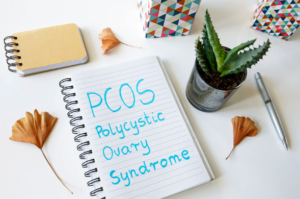What is PCOS?
Polycystic ovary syndrome, abbreviated PCOS, is the most common endocrine disorder in women of childbearing age. The syndrome is characterized by the development of multiple cysts on one or both ovaries.
The term “PCOS” was introduced in 1935 by Dr. Harry Crane who described it as a condition presenting with ovarian dysfunction and amenorrhea (absence of menstruation) caused by anovulation (lack of ovulation). Less than 3% of women with PCOS have a genetic cause for their symptoms while the rest have been found to have insulin resistance or other metabolic abnormalities.
If left untreated, PCOS can lead to serious complications such as type 2 diabetes, heart disease, high cholesterol levels, and ovarian cancer. There are several approaches to treatment which include lifestyle.
The signs and symptoms can vary from one woman to the next but if you think you might have PCOS, talk with your healthcare provider about getting diagnosed.
What are the Signs of PCOS?
If you have PCOS, you may notice any of the following signs:
- Excessive hair growth on the face and body
- Acne on your back or chest
- Cysts in your ovaries or thickening of your uterine lining
- Infertility cannot be explained by other factors such as age, weight, stress levels or lifestyle.
What Causes PCOS?
There is currently no cure for PCOS. A combination of genetic and environmental factors is likely to be the reason. One theory is that excess levels of male hormones (called androgens) in women cause PCOS symptoms. Research suggests there are also metabolic problems that make it harder for women with PCOS to process sugar in food
What are the Symptoms of PCOS?
The symptoms of PCOS vary from person to person, but they may include:
- Irregular periods or no periods at all.
- A sense of feeling constantly bloated.
- Excessive hair growth on the face and/or body.
- Male pattern baldness; Increased acne breakouts or greasy skin; A sense of feeling perpetually tired
How does PCOS Affect Your Body?
When you have PCOS, you have too many androgen hormones. That may mean that your ovaries produce too much testosterone. They may also release eggs very infrequently or not at all.
PCOS can also make it harder for your body to break down glucose, so there may be higher levels of insulin in your body. And in some cases, there are cysts on the ovaries that can cause pain and other symptoms.
How Do You Prevent and Manage PCOS?
Women with PCOS can improve their hormonal health and well-being by following healthy lifestyle habits, including diet and exercise.
Diet
By reducing calories and/or carbohydrates, you can promote weight management and improve ovarian function. Studies have indicated that consuming fewer refined carbohydrates and dairy products may promote weight loss, reduce testosterone levels, and improve insulin sensitivity.
Physical Activity
The following exercise guidelines for weight management are provided by the International Guideline for the Assessment and Management of PCOS.
To avoid gaining weight, do the following:
- Young adults: Three days per week, 60 minutes of moderate to strenuous exercise, including strengthening of the muscles and bones.
- Adults ages 18-64: Two days per week of moderate physical activity, or 75 minutes of vigorous physical activity, including muscle strengthening.
To reduce weight or avoid weight regain, follow these steps:
- Physical activity of 250 minutes a week or 150 minutes of vigorous activity a week, with exercises aimed at strengthening muscles and bones three times per week.
- Sit less and minimize screen time.
Weight Management
Goal-setting, self-monitoring, and utilizing social support are some of the healthy lifestyle or behavioral strategies that can help women with PCOS lose weight. Research indicates that people who are overweight may be able to increase ovulation frequency and chances of pregnancy as well as enhance hormonal balance by losing 5 to 10% of body mass.
Other lifestyle aspects to consider
Psychological problems such as anxiety or depression symptoms, body image worries, and disordered eating can all contribute to PCOS management. Seek out support, such as cognitive-behavioral therapy and counseling, from your healthcare provider.
Polycystic ovarian syndrome or PCOS is a hormonal disorder that can cause a slew of problems for women, including infertility, metabolic syndrome, and hair growth on the face and body. In this article, we have discussed what PCOS is and how you can prevent and manage it.
Acupuncture and herbs can help to reduce the symptoms associated with PCOS. Acupuncture and herbs have been shown in studies to help decrease the LH and testosterone levels and promote the recovery of menstrual cycles in patients with PCOS.
Traditional Chinese Medicine is also very good for improving fertility if PCOS is making getting pregnant more difficult.
For more in-depth analysis, contact us to schedule a consult session.
References:
- Ndefo, U. & Green M. (2013). Polycystic Ovary Syndrome: A Review of Treatment Options With a Focus on Pharmacological Approaches. MediMedia USA, Inc.
- Krishnan, A. & Muthusami S. (2017). Hormonal alteration in PCOS and its influence on bone metabolism. Society for Endocrinology
- Sharma, S. & Mahajan, N. (2021). Polycystic Ovarian Syndrome and Menopause in Forty Plus Women. J Midlife Health



